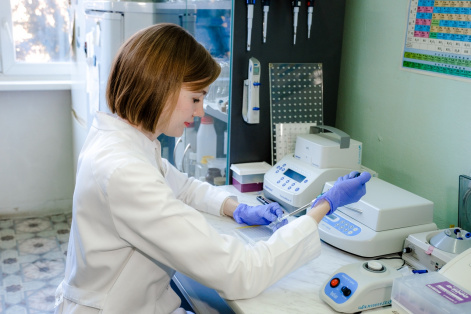According to Krasnoyarsk scientists the survivin protein may help fight cancer
20 April 2021 г.

The survivin protein may be responsible for starting or stopping the processes of self-destruction of cells, in particular, cancer cells. In this regard, it is considered to be a very promising tool for the diagnosis of malignant neoplasms. Moreover, the researchers believe that this protein can be used to control cell death. If we understand the mechanisms triggering this process, we can choose targets for diagnostics and molecular control of tumor cell growth.
Scientists from several scientific organizations in Krasnoyarsk, including the Krasnoyarsk Science Center SB RAS, analyzed a number of international scientific papers devoted to the survivin protein. They summarized the results of the studies dealing with the effect of protein on the development of malignant neoplasms. Numerous data allowed them to classify survivin as a promising tool for the development of diagnostic devices for cancers and new highly effective anticancer drugs. This work was the first stage of a project of Krasnoyarsk scientists aimed at creating and developing molecular genetic methods for diagnosing the recurrence of non-muscle invasive bladder cancer, with this project being supported by the Krasnoyarsk Regional Science Foundation.
Survivin is a low molecular weight zinc-containing protein formed in the human body. Its main function is considered to be blocking the death of tumor cells, which produce this protein. In numerous studies, scientists note the pathological role of this protein. The excessive formation of survivin is detected in more than half of patients with osteosarcoma and advanced neuroblastoma, in half of patients with colorectal cancer and lymphomas, and in a third of patients with stomach cancer. In addition, an increased amount of this protein is found in the case of other cancers, benign tumors and precancerous diseases. There is also a regularity between the level of survivin synthesis and the localization, stage and state of the tumor. At the same time, the quantitative increase in protein is often associated with the development of the disease.
In this regard, many researchers believe that survivin can be used to diagnose cancer. Several studies show that this protein significantly improve the predictive accuracy of bladder cancer recurrence. The study of the mutational profile of the survivin gene makes it possible to determine polymorphisms which increase the genetic risk of predisposition to malignant recurrence of the disease.
Now scientists of KSC SB RAS have begun implementing a project funded by a grant from the Krasnoyarsk Regional Science Foundation. Within its framework the diagnostic and prognostic potential of survivin will be studied and molecular genetic methods for diagnosing and stratifying the risk of recurrence of non-muscle invasive bladder cancer will be developed. Moreover, oncologists will be directly involved in the research.
“Modern oncology has made significant progress in the treatment and diagnosis of cancer. However, the insidiousness of these diseases is that at the early stages they are almost asymptomatic. Meanwhile, the earlier the disease is detected, the more successful the treatment will be. Therefore, the problem of early diagnosis and search for markers which could provide such diagnostics are extremely urgent. Another problem is the recurrence of the tumor: sometimes after the treatment, the tumor reappears in an even more severe form. Unfortunately, the reasons for this development are still poorly understood, but learning how to predict it and choose the right therapy is an extremely important task. We hope that as a result of this study, a highly sensitive non-invasive method for detecting the tumor marker survivin will be developed and its diagnostic value for the early detection of bladder cancer will be determined, as well as the possibility of predicting the recurrence of this disease using molecular genetic analysis, " explained Doctor of Biological Sciences, Head of the Laboratory at the Institute of Biophysics SB RAS, Lyudmila Frank.
Share:
